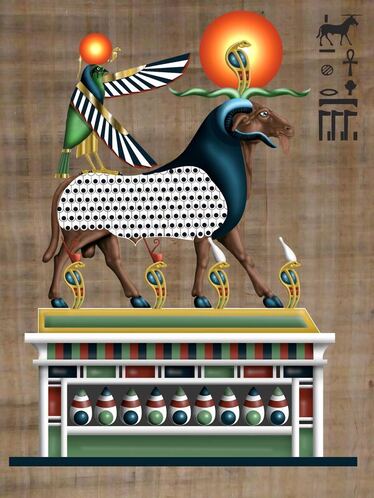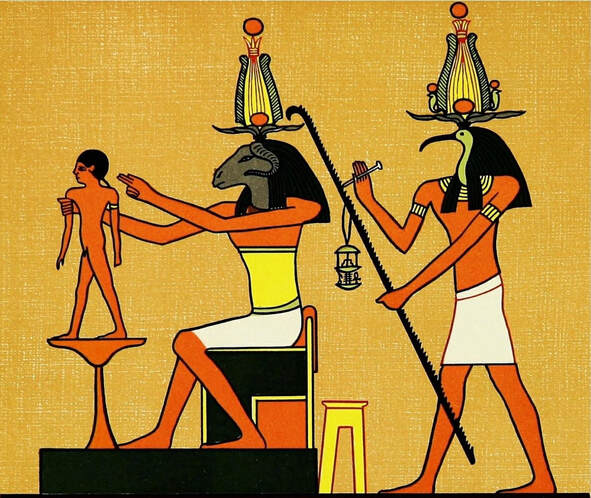Per-Khnemu
𓎸𓃝 𓎸𓅓𓏲𓁠 𓈙𓈖𓈋𓁡 𓎸𓅓𓏲𓃝
𓎸𓅓𓅱𓀭 𓎸𓅱 𓎸𓅱𓁠 𓎸𓃝𓀭 𓎸𓅓𓏲𓄅
𓎸𓅓𓅱𓊹Budge 𓎸𓅓𓏲𓅆 𓎸𓀭Budge 𓎸𓅱𓊹Budge
𓎸𓅱𓃝 𓎸𓅱𓀭 𓁠 𓎸𓅆Budge 𓎸𓅱𓅓𓀭Budge 𓎸𓁠Budge
𓎸𓅓𓏭𓏛𓀭 Budge 𓎸𓅓𓅱𓁠Budge 𓃝𓏤 𓎸𓅱𓃝𓀭
MDC : Xnmw
Gardiner : H̱nmw, Chnum
Budge : Khnem
Transliteration : Khnemw, Khnem
Demotic : H̱nm
Coptic : Knoum/ ϧⲛⲟⲩⲙ , phnoum/ ⲫⲛⲟⲩⲙ (B) , Ḥnoum/ ϩⲛⲟⲩⲙ (S)
Proto-Afro-Asiatic : xanam
Hebrew : Chnwm/ חנוﬦ
Gnostic Greek : Khnoubis /Χνουβις, Khnoumis /Χνου𝛍ς , Khnouphis /χνουφις
Koinē Greek : Khnoubis/Χνοῦβις
Greek : Khnoum/Χνου𝛍, Khnoubis/Χνουβιζ, Khnoûbis
Demotic : Khenub
Arabic : Khanom/ خنوم, Ghunum / غنوم, Ḡhanam/ غنم , Khuruf/ خروف 'Sheep, goat'
Russian : Хнум
English : Khnum
Kemetic : Khnum
Alternative names : Chnum, Chenemu
Pronounced : Khnum (common), Knoum (more accurate)
Alt Pronounced : Xanâmaw , Khnemu , Khanamu
IPA reconstruction : çaˈnaːmaw, xa'na:mu (Old Egyptian, c. 2500 BCE),
çaˈnaːmaw (Middle Egyptian, c. 1700 BCE) ,
xə'na:mə (New Egyptian)
çəˈnoːm (Late Egyptian, c. 800 BCE),
çɛnmu (modern Egyptological)
Meaning: "Who united/joined" - /Xnm/𓎸𓅓𓏜 "united" ,"joined"
Gardiner : H̱nmw, Chnum
Budge : Khnem
Transliteration : Khnemw, Khnem
Demotic : H̱nm
Coptic : Knoum/ ϧⲛⲟⲩⲙ , phnoum/ ⲫⲛⲟⲩⲙ (B) , Ḥnoum/ ϩⲛⲟⲩⲙ (S)
Proto-Afro-Asiatic : xanam
Hebrew : Chnwm/ חנוﬦ
Gnostic Greek : Khnoubis /Χνουβις, Khnoumis /Χνου𝛍ς , Khnouphis /χνουφις
Koinē Greek : Khnoubis/Χνοῦβις
Greek : Khnoum/Χνου𝛍, Khnoubis/Χνουβιζ, Khnoûbis
Demotic : Khenub
Arabic : Khanom/ خنوم, Ghunum / غنوم, Ḡhanam/ غنم , Khuruf/ خروف 'Sheep, goat'
Russian : Хнум
English : Khnum
Kemetic : Khnum
Alternative names : Chnum, Chenemu
Pronounced : Khnum (common), Knoum (more accurate)
Alt Pronounced : Xanâmaw , Khnemu , Khanamu
IPA reconstruction : çaˈnaːmaw, xa'na:mu (Old Egyptian, c. 2500 BCE),
çaˈnaːmaw (Middle Egyptian, c. 1700 BCE) ,
xə'na:mə (New Egyptian)
çəˈnoːm (Late Egyptian, c. 800 BCE),
çɛnmu (modern Egyptological)
Meaning: "Who united/joined" - /Xnm/𓎸𓅓𓏜 "united" ,"joined"
Home:
Temple: Abu/Elephantine Island; Temple called iw.n innf, sAt n sAw, HAy.t n Hsb aHa and pr-Xnmw in the City of Iunyt or Ta-Senet Esna/Latopolis 3rd nome of Upper Egypt for Khenmu-Ra; pr Xnmw nb SAsHtpw in Hyselis, pr Xnmw Temple of Khnemu in Thebes, nst wr n nb nbw Temple in Sni (isni)
Nome: pr-Xnmw nb Ht wrt Nome MaHedj
Consort
Satet/ Satis
Heket
Menhit (As Crocodile-headed god)
Nebtu/nbt-ww (As Crocodile-headed god)
Nebtuwi/nb-tA-Dsr goddess personifying fertility (lady of the field)
Heket or Meskhenet (alternative consorts)
Heqet (In Hr-wr/Antinoe/Ἀντινόη)
Children
Anqet/Anukis
Serket
Ra W/Satis or w/Neith/nit
Heka (As Crocodile-headed god)
Father
Nun
Mother
Siblings
Nit/Neith Sister
Alternative Parentage
Self-Created One
Priest names
Features
Ram headed man at a potter's wheel,
Khnem-sekhet-ish/Has 7 forms: nHp (The potter), nb-pr-mHty, nb-pSnw, nb-smin(t), nb-tA-anxtt (Lord of the other world), nb-Drwr(t), Hrw-Htp, xnty-inb.f, qd-Hrw-nbw (Maker of mankind on the potter's wheel)
Symbols
Potter's wheel
Clay
Silt
Ram
Green
Roles
He first appeared as a Helper of Sopdet and Satis/ stt, Later he became the God of creation who makes mankind and divinity on his potter's wheel. He is also the god of all the waters of the world and Underworld. He is the 3rd aspect of Ra. Patron of potters. Protector of the dead. Associated with fertility. The Ba (Soul) of Ra.
Connection to other gods
Min
Ra
Wesir
Her-Shef
Auset
Hybrid gods
Khnum-Ra
Aspect of Ra
Khepri: Morning sun manifested. Was born from the waters of Nu from a blue lotus bud. When the petals opened it revealed the beetle Kheperi.
Atum: Evening sun manifested. Was born from the waters of Nu from a blue lotus bud.
Nefertum: Was born from the waters of Nu from a blue lotus, When the petals opened it revealed a scarab. It changes into a young boy who is crying he became Nefertum.
Khnemu: Sunset Manifested.
Celebrations
4 Akhet
1 to 6-Festival(s) (Article does not say which ones)
3 Peret
1-Festival of Installation of the Potter’s Wheel and Festival of Raising Heaven
3 Shomu
13-Festival of the Visit of the Goddess Nit
20-Festival of the Victory of Khnum-Ra
Offering items
Clay
Water
Potters wheel
Sculpting tools
Soil
Myrrh
Beer
Other names
ir-Hs-nfr
Knufi 𓎡𓏌𓏲𓆑𓇌 > Khnəph/Χνέφ , Knéph/Κνήφ , Knouphis/Κνουφιϛ (Greek) > Khnoumis/ⲭⲛⲟⲩⲙⲓⲥ , Khnoupʰis/ⲭⲛⲟⲩⲫⲓⲥ,
Khnoubis/ⲭⲛⲟⲩⲃⲓⲥ (Coptic) (Late Form)
Names derived from the God's name
Khnumhotep/ Xnmw-Htp "Khnum is pleased"
Epitaphs
Hapy-wr-- Great nile (Khnum-ra)
Hapy-pt-- Nile Heaven (Khnum-ra) ?
iqdw- Potter in action, builder
it itw-- Father of fathers
it n nTrw nTrwt- Father of gods and goddess
nb-Abw -- Lord of Elephantine
nb anx-- lord of life
nb Hr-wr--Lord of Her-wer
nb-qbHw-- Lord of cooling water/ Purify
qbH-- Purify
qd-- Potter 𓐪𓂧𓏌
qd-Haw--He who models the body
qd Hr nHp -- The potter upon the Potter's wheel
qd ir nip --Potter
qd nTry --Devine Potter
qd rmT-- Potter of humans
xnm nb-tA anxtt--Khnemu lord of the other world
xnm nb-wabt-- Khnemu Lord of the Elphantine and Philae
xnm nHp ---Khnemu the potter
xnty-pr-anx -- master of the house of life
xnty-nDm-nDm-anxt -- Foremost of the marriage chamber (Master of the sex house of life?)
xnty pr anx m Abw-- Foremost of the house of life in Elephantine
xnty-tAwy-nTrw --Foremost of the two lands of gods
Sft-HAt-- four-headed
Good Protector
He Who Activates the Ka
Lord of Esna
nb SA/ nb AHwt/ nb sxt ?--Lord of the Field
Who Causes the Vegetation to Germinate
Who Creates All Beings
Who Creates the Gods and Forms Human Beings
Who Enlightens Egypt with His Rays
Who Exists at the Beginning
Who Keeps Creation Alive
Who Measures the Fields
Who is in His Great Place
Ref. http://fiercelybrightone.com/2014/04/29/khnum-lord-of-esna
Temple: Abu/Elephantine Island; Temple called iw.n innf, sAt n sAw, HAy.t n Hsb aHa and pr-Xnmw in the City of Iunyt or Ta-Senet Esna/Latopolis 3rd nome of Upper Egypt for Khenmu-Ra; pr Xnmw nb SAsHtpw in Hyselis, pr Xnmw Temple of Khnemu in Thebes, nst wr n nb nbw Temple in Sni (isni)
Nome: pr-Xnmw nb Ht wrt Nome MaHedj
Consort
Satet/ Satis
Heket
Menhit (As Crocodile-headed god)
Nebtu/nbt-ww (As Crocodile-headed god)
Nebtuwi/nb-tA-Dsr goddess personifying fertility (lady of the field)
Heket or Meskhenet (alternative consorts)
Heqet (In Hr-wr/Antinoe/Ἀντινόη)
Children
Anqet/Anukis
Serket
Ra W/Satis or w/Neith/nit
Heka (As Crocodile-headed god)
Father
Nun
Mother
Siblings
Nit/Neith Sister
Alternative Parentage
Self-Created One
Priest names
Features
Ram headed man at a potter's wheel,
Khnem-sekhet-ish/Has 7 forms: nHp (The potter), nb-pr-mHty, nb-pSnw, nb-smin(t), nb-tA-anxtt (Lord of the other world), nb-Drwr(t), Hrw-Htp, xnty-inb.f, qd-Hrw-nbw (Maker of mankind on the potter's wheel)
Symbols
Potter's wheel
Clay
Silt
Ram
Green
Roles
He first appeared as a Helper of Sopdet and Satis/ stt, Later he became the God of creation who makes mankind and divinity on his potter's wheel. He is also the god of all the waters of the world and Underworld. He is the 3rd aspect of Ra. Patron of potters. Protector of the dead. Associated with fertility. The Ba (Soul) of Ra.
Connection to other gods
Min
Ra
Wesir
Her-Shef
Auset
Hybrid gods
Khnum-Ra
Aspect of Ra
Khepri: Morning sun manifested. Was born from the waters of Nu from a blue lotus bud. When the petals opened it revealed the beetle Kheperi.
Atum: Evening sun manifested. Was born from the waters of Nu from a blue lotus bud.
Nefertum: Was born from the waters of Nu from a blue lotus, When the petals opened it revealed a scarab. It changes into a young boy who is crying he became Nefertum.
Khnemu: Sunset Manifested.
Celebrations
4 Akhet
1 to 6-Festival(s) (Article does not say which ones)
3 Peret
1-Festival of Installation of the Potter’s Wheel and Festival of Raising Heaven
3 Shomu
13-Festival of the Visit of the Goddess Nit
20-Festival of the Victory of Khnum-Ra
Offering items
Clay
Water
Potters wheel
Sculpting tools
Soil
Myrrh
Beer
Other names
ir-Hs-nfr
Knufi 𓎡𓏌𓏲𓆑𓇌 > Khnəph/Χνέφ , Knéph/Κνήφ , Knouphis/Κνουφιϛ (Greek) > Khnoumis/ⲭⲛⲟⲩⲙⲓⲥ , Khnoupʰis/ⲭⲛⲟⲩⲫⲓⲥ,
Khnoubis/ⲭⲛⲟⲩⲃⲓⲥ (Coptic) (Late Form)
Names derived from the God's name
Khnumhotep/ Xnmw-Htp "Khnum is pleased"
Epitaphs
Hapy-wr-- Great nile (Khnum-ra)
Hapy-pt-- Nile Heaven (Khnum-ra) ?
iqdw- Potter in action, builder
it itw-- Father of fathers
it n nTrw nTrwt- Father of gods and goddess
nb-Abw -- Lord of Elephantine
nb anx-- lord of life
nb Hr-wr--Lord of Her-wer
nb-qbHw-- Lord of cooling water/ Purify
qbH-- Purify
qd-- Potter 𓐪𓂧𓏌
qd-Haw--He who models the body
qd Hr nHp -- The potter upon the Potter's wheel
qd ir nip --Potter
qd nTry --Devine Potter
qd rmT-- Potter of humans
xnm nb-tA anxtt--Khnemu lord of the other world
xnm nb-wabt-- Khnemu Lord of the Elphantine and Philae
xnm nHp ---Khnemu the potter
xnty-pr-anx -- master of the house of life
xnty-nDm-nDm-anxt -- Foremost of the marriage chamber (Master of the sex house of life?)
xnty pr anx m Abw-- Foremost of the house of life in Elephantine
xnty-tAwy-nTrw --Foremost of the two lands of gods
Sft-HAt-- four-headed
Good Protector
He Who Activates the Ka
Lord of Esna
nb SA/ nb AHwt/ nb sxt ?--Lord of the Field
Who Causes the Vegetation to Germinate
Who Creates All Beings
Who Creates the Gods and Forms Human Beings
Who Enlightens Egypt with His Rays
Who Exists at the Beginning
Who Keeps Creation Alive
Who Measures the Fields
Who is in His Great Place
Ref. http://fiercelybrightone.com/2014/04/29/khnum-lord-of-esna
Invocation to Khnemu
A morning hymn to Khnum, from the temple of Esna
Awakenings of Khnum; say:
Wake well in peace, wake well in peace,
Khnum-Amun, the ancient,
Issued from Nun,
In peace, awake peaceably!
Wake, lord of fields,
Great Khnum,
Who makes his domain in the meadow,
In peace, awake peaceably!
Wake, lord of gods and men,
Lord of the war cry,
In peace, awake peaceably!
Wake, mighty planner,
Great power in Egypt,
In peace, awake peaceably!
Wake, lord of life,
Wooer of women,
To whom come gods and men as he bids,
In peace, awake peaceably!
Wake, ram great of majesty,
Tall-plumed, sharp-horned,
In peace, awake peaceably!
Wake, great lion,
Slayer of rebels,
In peace, awake peaceably!
Wake, crocodile-king, Mighty victor,
Who conquers as he wishes,
In peace, awake peaceably!
Wake, veiled-faced one,
Who shuts his eyes to his foes,
As he bears arms,
In peace, awake peaceably!
Wake, leader of herdsmen,
Who grasps the stick,
Smites his attacker,
In peace, awake peaceably!
Wake, great crocodile who says,
“Each of you shall slay his fellow,”
In peace awake, peaceably!
Wake, Shu, strong-armed,
His father’s champion,
Slayer of rebels,
In peace, awake peaceably!
Wake, fighting ram who chases his foes,
Herdsman of his followers,
In peace, awake peaceably!
Wake, multiform one,
Who changes shape at will,
In peace, awake peaceably!
Wake, Khnum who fashions as he wishes,
Who sets every man in his place!
~Miriam Lichtheim – Ancient Egyptian literature, vol.III, p.110-111




